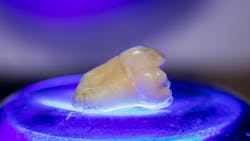Forget expensive implants, fillings, dentures, and unsatisfied patients. Dentists will soon be replacing teeth by growing them in labs and placing them in people’s mouths, and this could happen as early as 2030.
Decades of research by a team in Japan has been making great strides. The team at King’s College London has been diligently working toward growing human teeth. If their clinical trials are successful in the coming months and years, the breakthrough could be only five years away from being offered to the public.
Their approach is based on the fact that at one time, humans were actually able to grow a third set of teeth beyond the baby and adult teeth, and we still possess the bud for the third set.1
The King’s College team discovered that the molecule USAG-1 is a protein that limits tooth growth. Led by Katsu Takahashi, a researcher in Osaka, the team sought to block the protein’s function with a new antibody medicine. Their tests were successful on mice in 2018, and they’re now undergoing trials to test the antibody on humans. Early results are promising.
From stem cells to smiles: Natural tooth regeneration
But let’s back up a little bit … their tests began by mimicking how teeth grow in the body. Teeth begin growing from stem cells during the embryonic stage. Stems cells from different types of embryonic tissue “talk” to each other and form various forms of cells, some of which become teeth.1
The researchers made a breakthrough by developing a material that allows cells to talk to each other as they would in the body. This led to them successfully growing a tooth in their lab earlier this year.1
Lab-grown teeth "would naturally regenerate, integrating into the jaw" in the same way as real teeth. "They would be stronger, longer lasting, and free from rejection risks, offering a more durable and biologically compatible solution than fillings or implants," said Xuechen Zhang, a final-year PhD student at the Faculty of Dentistry, Oral and Craniofacial Sciences, King’s College London.2
Take an in-depth dive into the research.3
Lab-grown teeth will start by treating children with anodontia
Their next step? Figuring out how to place the tooth in the mouth.
"We have different ideas to put the teeth inside the mouth. We could transplant the young tooth cells at the location of the missing tooth and let them grow inside mouth," Zhang told BBC. "Alternatively, we could create the whole tooth in the lab before placing it in the patient's mouth."4
They hope to start in humans by treating children aged two to six with anodontia, a hereditary condition believed to affect around 0.1% of people, which causes wide gaps between teeth that make it hard to chew food.2
The bottom line is, this all adds up to an exciting game-changer for the future of dentistry and people’s mouths.
References
1. Thomson J. Lab grown teeth could offer alternative to fillings and implants, scientists say. Live Science. April 25, 2025. https://www.livescience.com/health/lab-grown-teeth-could-offer-alternative-to-fillings-and-implants-scientists-say
2. The science behind regrowing missing teeth. The Week. https://theweek.com/health/the-science-behind-regrowing-missing-teeth?utm_source=chatgpt.com
3. Zhang X, Negini NC, Correia R, Sharpe PT, Celiz AD, Volponi AA. ACS Macro Letters. Generating tooth organoids using defined bioorthogonally cross-linked hydrogels. 2024;13(12). https://pubs.acs.org/doi/10.1021/acsmacrolett.4c00520#
4. O’Neill A. Lab-grown teeth to ‘fill in the gaps’ in regenerative dentistry. BBC. April 13, 2025. https://www.bbc.com/news/articles/cj9ejj3jzrwo
About the Author

Meg Kaiser
Associate Editor
Meg Kaiser is an associate editor in Endeavor Business Media’s Dental Division. She works on DentistryIQ.com, RDH eVillage and RDH Graduate newsletters, Dental Economics magazine, and RDH magazine, and has for nearly 20 years. She knew she'd caught the dental bug when she began preaching oral-systemic health to everyone she met. Contact her at [email protected].
